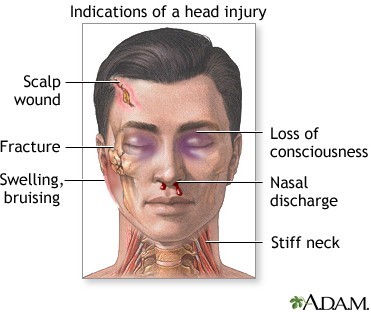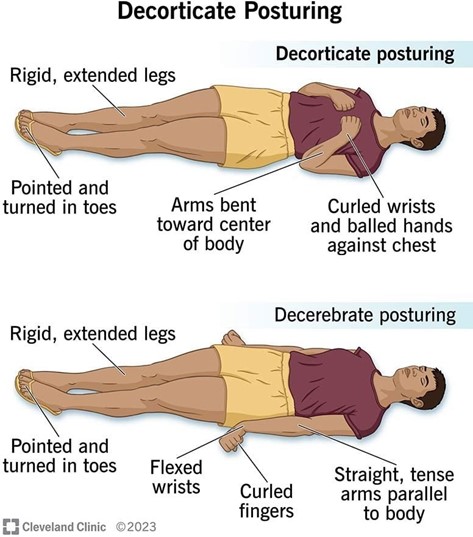A nurse is collecting data from a client who has a traumatic head injury. Which of the following findings should the nurse report to the provider immediately?
Sudden sleepiness
Headache
Diplopia
Slight ataxia
The Correct Answer is A
The nurse should report sudden sleepiness to the provider immediately if the client has a traumatic head injury. Sudden sleepiness can indicate an increase in intracranial pressure, which can be a life-threatening complication of a head injury.
Headache, diplopia, and slight ataxia are also important findings that the nurse should report to the provider. However, these findings are not as urgent as sudden sleepiness. Headache can be a common symptom following a head injury. Diplopia is double vision and can indicate cranial nerve damage. Slight ataxia is unsteadiness or lack of coordination and can indicate neurological damage.

Nursing Test Bank
Naxlex Comprehensive Predictor Exams
Related Questions
Correct Answer is D
Explanation
a. Decorticate posturing is marked by the flexion of the arms, with the hands clenched into fists and the legs extended and internally rotated.
b. External rotation of the lower extremities is not a characteristic of decorticate posturing. In decorticate posture, legs are held out straight.
c.Pronation of the hands is characteristic of decerebrate posturing, where the arms are extended and pronated.
d. In decorticate posturing, the lower extremities typically exhibit plantar flexion. Additionally, the upper extremities show flexion of the arms, wrists, and fingers with adduction of the arms.

Correct Answer is ["A","D","E"]
Explanation
These are the correct interventions that the nurse should take. Applying a compression bandage to the client's ankle can help reduce swelling and provide support to the injured area. Elevating the client's foot can also help reduce swelling by promoting venous return. Checking the client's toes for color, temperature, and sensation is important to assess for any potential nerve or vascular damage.
Applying heat to the client's ankle is not recommended as it can increase swelling and inflammation. Encouraging range of motion of the client's foot is also not recommended as it can cause further injury to the affected area.
Whether you are a student looking to ace your exams or a practicing nurse seeking to enhance your expertise , our nursing education contents will empower you with the confidence and competence to make a difference in the lives of patients and become a respected leader in the healthcare field.
Visit Naxlex, invest in your future and unlock endless possibilities with our unparalleled nursing education contents today
Report Wrong Answer on the Current Question
Do you disagree with the answer? If yes, what is your expected answer? Explain.
Kindly be descriptive with the issue you are facing.
